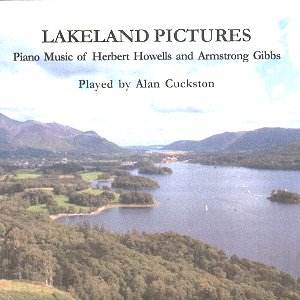LAKELAND PICTURES: Piano Music of HOWELLS
and ARMSTRONG GIBBS Herbert
HOWELLS (1892-1983)
Gadabout (1928); Slow Dance (1928); Cobbler's Hornpipe
(1928); There was a most beautiful lady (1928); Triumph Tune
(1934); Sarum Sketches (1917); Rhapsody (1919);
Jackanapes (1919)
ARMSTRONG GIBBS (1889-1960)
In the High Alps - suite (1925); Lakeland Pictures - eight
preludes (1940)
 Alan Cuckston (piano)
Alan Cuckston (piano)
rec Leeds, March 1991; Ripon, Oct
2000
 SWINSTY FEW 123CDr
[70.16]
SWINSTY FEW 123CDr
[70.16]

Alan Cuckston, in 1991, set himself a challenge in recording (on cassette,
mark you!) a selection of the Howells' solo piano music. By 1994 his
largely unknown recording was, in some measure, in competition with Margaret
Fingerhut's lucidly recorded Chandos all-Howells CD (CHAN9273). Both the
Swinsty disc and the now deleted Howells/Bernard Stevens (Gamut CD54) by
Jeremy Filsell have the advantage of variety over the single composer Chandos.
Howells is a common factor in the Filsell and Cuckston though the programmes
differ. Filsell and Gamut offer Gadabout, Three Pieces and
the Sonatina alongside Bernard Stevens' powerful Sonata in one
movement (1954) and Aria. The Swinsty has two virtually unknown
and surprising sequences by Armstrong Gibbs.
Cuckston (warmly and, perhaps a tad claustrophobically, recorded, especially
in the case of Gadabout) presents the brusque Gadabout and
Cobler's Hornpipe. The latter has a suggestion of early keyboard about
it (we bear in mind that Howells' wrote sequences called Lambert's Clavichord
and Howells' Clavichord in which his friends are pictured within)
and Rubbra's Farnaby Improvisations. The Finzian 'sleight of hand'
of Slow Dance sounds as if the microphone placement had been refined
to advantage after Gadabout. In There was a most beautiful lady
the 'lady' is Armstrong Gibbs' daughter Anne and makes much of slowest
swirling voile effect. Triumph Tune is Graingerish (Country
Gardens). The Tune is dedicated to Howells' children, Michael
and Ursula. It was Michael's death in 1935 that prompted Howells' Hymnus
Paradisi in 1938.
The Sarum Sketches are dedicated to one of the Salisbury Cathedral
choirboys, John Stewart. The second of the Sketches is in part a Bainesian
list of dreamy caprices. The Arabian Nights movement is sinister capturing
the danger of the tales rather than their Victorianised tameness - extremely
well done. Rhapsody is almost static in its sleepwalking slow blunder
through a nocturnal landscape and Jackanapes is a tipsy brisk stroll.
Armstrong Gibbs' First and Third Symphonies were recorded some years
ago by Marco Polo. The Third, The Westmorland, links with the present
album, having been composed in, and inspired by, the Lake District. In
the High Alps has an insistent theme suggestive of the Alps jutting above
the pine wood weighed down with snow. This is half way between high romance
and impressionism. The music is surprisingly spiced with a light dusting
of dissonance and the Winter Sport movement has a Scottish slant,
an opalescence and a Medtnerian sense of the dramatic.
The Lakeland Pictures was written in October 1940 but lost until 1996.
The movements carry double titles: mood/picture and place name. Brooding
- Thirlmere is a crystalline portrait which is less brooding than you
might expect. After Rain - Rydal Beck, a Brahmsian gallop suggestive
of waters in lively spate. An Upland Valley - Watendlath treads the
fine line between regret and joy. Spring Lambs - Langdale rambles
through Handelian dignity, the innocence of a Peter Warlock song and even
a hint of de Falla's Nights In The Gardens Of Spain. This is followed
by the soft focus sentimentality of Early Autumn - Borrowdale, itself
hinting at a Rachmaninov 2 - a hit of the day. Pastoral - Winster
is predictably cold while the dark Lonely Grandeur - Wastwater has
about it more brooding than Thirlmere. The final piece is Quiet
Winter - Tarn Howes which is tinged with the same regret that hangs over
Finzi's song In Years Defaced And Lost.
Cuckston characterises all of this music with care and is recorded in an
enclosed and warm acoustic.
The variety of the music on this disc is welcome. It also offers some real
surprises; particularly in the case of the Gibbs' pieces.
Rob Barnett
Price per CD inclusive of p&p within UK is £11.00
Price per CD inclusive of p&p outside UK: please enquire
No credit cards
Phone/Fax: 01757 638238
email:
alancuckston@email.com
Swinsty Records
Turnham Hall
Cliffe
Selby
N Yorks YO8 6ED
United Kingdom

